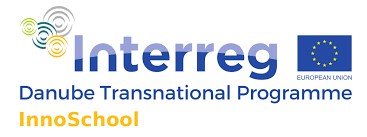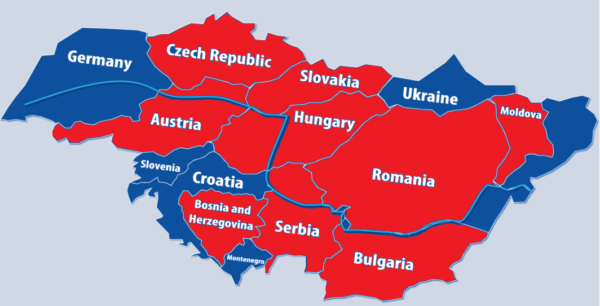
| Projektakronym | InnoSchool |
| Projekttitel |
Förderung des sozialen Innovations- und UnternehmerInnengeistes von SchülerInnen der Sekundarstufe durch ein innovatives Lernmodell |
| Priorität | PA1. Innovative und sozial verantwortliche Donauregion |
| Zielsetzung | SO1.2 Kompetenzen für UnternehmerInnentum und soziale Innovationen erhöhen |
| Gesamtbudget | 1.873.604,00 EUR (ERDF) |
| Projektdauer | 09/2018 – 02/2022 (42 Monate) |
| Lead Partner | DEX Innovation Center |
Project partnership
(11 partner institutions from 9 regions)
The partnership is well-composed as far as innovation performance is concerned: 1 ‘strong innovator country’ (AT); 4 ‘moderate innovator countries’ (CZ, SK, HU, SRB); 2 ‘modest innovator countries’ (RO, BG) + BiH and MDA (Rating according to the European Innovation Scoreboard).

Lead Partner DEX Innovation Centre (CZ)
ERDF PP1 Business Incubator – Gotse Delchev, Entrepreneurship Promotion Centre (BG)
ERDF PP2 The European Center for Socio Professional Integration ACTA (RO)
ERDF PP3 Central Transdanubian Regional Innovation Agency Nonprofit Ltd. (HU)
ERDF PP4 Vienna Board of Education, European Office (AT)
ERDF PP5 Technical University of Kosice (SK)
ERDF PP6 Regional Department of Education in Blagoevgrad (BG)
ERDF PP7 Centre for Resources and Educational Assistance of Bihor County (RO)
IPA PP1 Agency for economic development of Municipality Prijedor “PREDA-PD” (BIH)
IPA PP2 Regional Agency for Development and European Integration Belgrade (SRB)
ENI MD PP1 FACLIA – Association for Children and Youth (MDA)
Apart from the 11 project partners the consortium also has 6 associated strategic partners:
ASP1 Regional Authority of Liberec Region (CZ)
ASP2 Vocational Training Center, Székesfehérvár (HU)
ASP3 Ministry of Education and Culture of Republic of Srpska (BIH)
ASP4 Ministry of Education, Science and Technology Development (SRB)
ASP5 Kosice Self-governing Region (SK)
ASP6 Ungheni Education Directorate (MDA)
InnoSchool focuses on a systemic change in order to strengthen a founder culture and an awareness for social innovation and entrepreneurship. The main goal is strengthen the spirit of social innovation and entrepreneurship in the lives of upper secondary schools in the Danube region. In order to achieve this a highly innovative learning system will be developed, piloted and implemented.
The learning system will be based on ‘learning by playing’ using an online simulation as well as social media, which will be integrated into daily teaching.
Key competences in social innovation and entrepreneurship will be strengthened by the contents of the learning system. Apart from a keen awareness of pressing social topics, essential competences such as creativity, pro-activity, risk assessment and perseverance as well as business skills such as opportunity mapping, idea generation, business planning, etc. will be trained.
The singularity of the learning system lies in its innovative and pupil-centred components:
The development of the system will be the result of an intensive exchange and learning process between the partners and other important stakeholders and players through advisory and focus groups with pupils, teachers, representatives from industry and social institutions, NGOs and political bodies.
The InnoSchool learning system will consist of the following core elements:
By autumn 2020, the learning system will be piloted in upper secondary schools in all of the project regions, including Vienna.
Among others, the pilot study will concentrate on the attitudes and competences of the pupils involved in the pilot regarding three key competences necessary in social innovation enterprise:
In order to ensure the sustainability of the learning system in schools an action plan will be developed within two years after project lifetime.
In summing up, InnoSchool fulfils three tasks:




